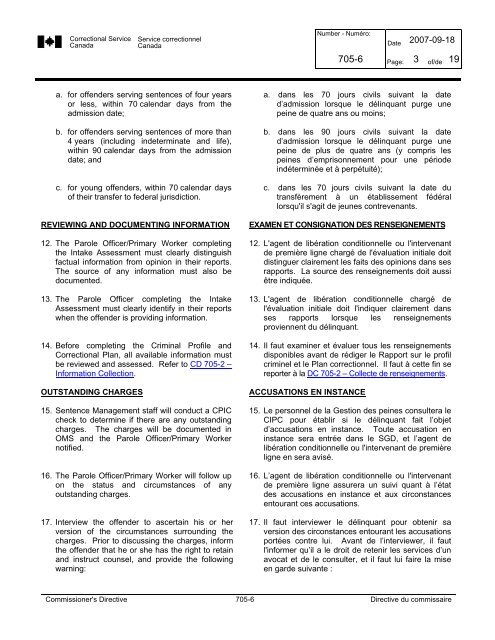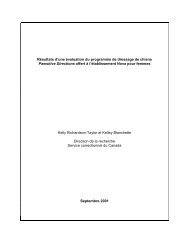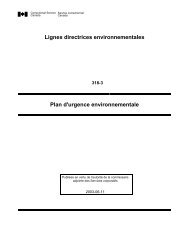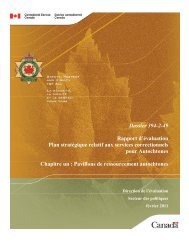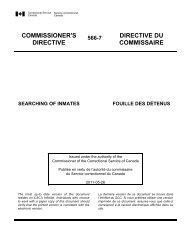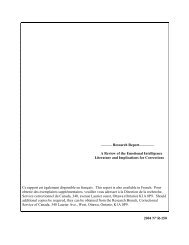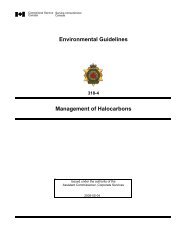CD 705-6 - Correctional Planning and Criminal Profile - Service ...
CD 705-6 - Correctional Planning and Criminal Profile - Service ...
CD 705-6 - Correctional Planning and Criminal Profile - Service ...
Create successful ePaper yourself
Turn your PDF publications into a flip-book with our unique Google optimized e-Paper software.
<strong>Correctional</strong> <strong>Service</strong> <strong>Service</strong> correctionnel<br />
Canada Canada<br />
a. for offenders serving sentences of four years<br />
or less, within 70 calendar days from the<br />
admission date;<br />
b. for offenders serving sentences of more than<br />
4 years (including indeterminate <strong>and</strong> life),<br />
within 90 calendar days from the admission<br />
date; <strong>and</strong><br />
c. for young offenders, within 70 calendar days<br />
of their transfer to federal jurisdiction.<br />
REVIEWING AND DOCUMENTING INFORMATION<br />
12. The Parole Officer/Primary Worker completing<br />
the Intake Assessment must clearly distinguish<br />
factual information from opinion in their reports.<br />
The source of any information must also be<br />
documented.<br />
13. The Parole Officer completing the Intake<br />
Assessment must clearly identify in their reports<br />
when the offender is providing information.<br />
14. Before completing the <strong>Criminal</strong> <strong>Profile</strong> <strong>and</strong><br />
<strong>Correctional</strong> Plan, all available information must<br />
be reviewed <strong>and</strong> assessed. Refer to <strong>CD</strong> <strong>705</strong>-2 –<br />
Information Collection.<br />
OUTSTANDING CHARGES<br />
15. Sentence Management staff will conduct a CPIC<br />
check to determine if there are any outst<strong>and</strong>ing<br />
charges. The charges will be documented in<br />
OMS <strong>and</strong> the Parole Officer/Primary Worker<br />
notified.<br />
16. The Parole Officer/Primary Worker will follow up<br />
on the status <strong>and</strong> circumstances of any<br />
outst<strong>and</strong>ing charges.<br />
17. Interview the offender to ascertain his or her<br />
version of the circumstances surrounding the<br />
charges. Prior to discussing the charges, inform<br />
the offender that he or she has the right to retain<br />
<strong>and</strong> instruct counsel, <strong>and</strong> provide the following<br />
warning:<br />
Number - Numéro:<br />
Date<br />
2007-09-18<br />
<strong>705</strong>-6 Page: 3 of/de 19<br />
a. dans les 70 jours civils suivant la date<br />
d’admission lorsque le délinquant purge une<br />
peine de quatre ans ou moins;<br />
b. dans les 90 jours civils suivant la date<br />
d’admission lorsque le délinquant purge une<br />
peine de plus de quatre ans (y compris les<br />
peines d’emprisonnement pour une période<br />
indéterminée et à perpétuité);<br />
c. dans les 70 jours civils suivant la date du<br />
transfèrement à un établissement fédéral<br />
lorsqu'il s'agit de jeunes contrevenants.<br />
EXAMEN ET CONSIGNATION DES RENSEIGNEMENTS<br />
12. L'agent de libération conditionnelle ou l'intervenant<br />
de première ligne chargé de l'évaluation initiale doit<br />
distinguer clairement les faits des opinions dans ses<br />
rapports. La source des renseignements doit aussi<br />
être indiquée.<br />
13. L'agent de libération conditionnelle chargé de<br />
l'évaluation initiale doit l'indiquer clairement dans<br />
ses rapports lorsque les renseignements<br />
proviennent du délinquant.<br />
14. Il faut examiner et évaluer tous les renseignements<br />
disponibles avant de rédiger le Rapport sur le profil<br />
criminel et le Plan correctionnel. Il faut à cette fin se<br />
reporter à la DC <strong>705</strong>-2 – Collecte de renseignements.<br />
ACCUSATIONS EN INSTANCE<br />
15. Le personnel de la Gestion des peines consultera le<br />
CIPC pour établir si le délinquant fait l’objet<br />
d’accusations en instance. Toute accusation en<br />
instance sera entrée dans le SGD, et l’agent de<br />
libération conditionnelle ou l'intervenant de première<br />
ligne en sera avisé.<br />
16. L’agent de libération conditionnelle ou l'intervenant<br />
de première ligne assurera un suivi quant à l’état<br />
des accusations en instance et aux circonstances<br />
entourant ces accusations.<br />
17. Il faut interviewer le délinquant pour obtenir sa<br />
version des circonstances entourant les accusations<br />
portées contre lui. Avant de l’interviewer, il faut<br />
l'informer qu’il a le droit de retenir les services d’un<br />
avocat et de le consulter, et il faut lui faire la mise<br />
en garde suivante :<br />
Commissioner's Directive <strong>705</strong>-6 Directive du commissaire


